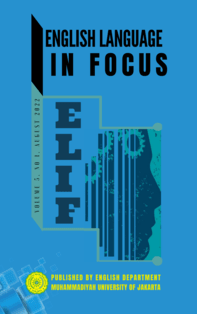Utilizing Noice App for Students Listening Skill
DOI:
https://doi.org/10.24853/elif.5.1.83-90Keywords:
Listening, Podcast, Noice ApplicationAbstract
The amount of capacity to learn a language varies from student to student. A student's ability can develop if they are exposed to appropriate and enjoyable learning techniques for improving their learning abilities. Therefore, the purpose of this research is aimed that using Podcast in Noice application can improve English learning process using the listening method. This research was conducted from May 10 until May 30 2023 at SMPN 6 South Tangerang. The method used in this research is a quantitative method with an experimental design that applied control class techniques. In collected data, the researcher used test as an instrument. Data collection was analyzed statistical use t-test formula. The results of the post-test were 81.15 compared to the pre-test were 64.23. Based on statistical analysis, the result of H1 was accepted and H0 was rejected. So, for the hypothesis H1 was accepted it can be concluded that using Podcast in Noice application is effective technique to improve students listening skill mastery.References
Ahmadi, S.M & Leong,L.M. 2017. An Analysis Factor Influencing Learners’ English Speaking Skill. International Journal of Research in English Education. 2,1,34-41
Gilakjani, A.P., & Ahmadi, S. M. (2011). The effect of text familiarity on Iranian EFL learners’ listening comprehension. Journal of Language Teaching and Research, 2(4), 783-789
Hamouda, A. (2013) An Investigation of Listening Comprehension Problems Encountered by Saudi Students in the EL Listening Classroom. International Journal of Academic Research in Progressive Education and Development, 2 (2), 113-115.
Queirós, A., Faria, D., & Almeida, F. (2017). Strengths and Limitations of Qualitative and Quantitative Research Methods. European Journal of Education Studies, 3, 369-387.
Published
Issue
Section
License
Authors who publish with this journal agree to the following terms:
- Authors retain copyright and grant the journal right of first publication with the work simultaneously licensed under a Creative Commons Attribution License that allows others to share the work with an acknowledgment of the work's authorship and initial publication in this journal.
- Authors can enter into separate, additional contractual arrangements for the non-exclusive distribution of the journal's published version of the work (e.g., post it to an institutional repository or publish it in a book), with an acknowledgment of its initial publication in this journal.
- Authors are permitted and encouraged to post their work online (e.g., in institutional repositories or on their website) before and during the submission process, as it can lead to productive exchanges, as well as earlier and greater citation of published work (See The Effect of Open Access).


